Cars & Bikes

Doctor Doom’s Greatest Quotes: Insights into the Mind of Marvel’s Most Complex Villain
April 25, 2025 10 min read
Doctor Victor Von Doom wasn't just Marvel’s first great supervillain—he was its first legend. From the moment he stepped out of the shadows in Fantastic Four #5, cloaked in science and sorcery, he wasn’t merely an adversary—he was the storm on the horizon. The inevitable. The iron-willed reflection of Reed Richards and the eternal arch-nemesis of the Fantastic Four. And though his roots were entwined with their story, his reach soon spread—stretching across the Marvel Universe like a cold gauntlet around its throat.
Doom has faced nearly every hero who ever mattered. Not for fame. Not even always for power. But for purpose. For a vision of order shaped by his singular will. And though he has yet to cast his long shadow across the Marvel Cinematic Universe, it's not a matter of if—only when. Because after Thanos, there is no name that carries more dread, awe, and tragic grandeur than Victor Von Doom.
He is the ruler of Latveria. A sorcerer. A scientist. A king. A man who calls himself god, but bleeds like a man when no one is looking. His rivalry with the Fantastic Four is only part of a lifelong war—with destiny, with injustice, with the world that wronged him. And yet, time and again, there are moments when Doom acts not from malice—but from nobility. Twisted, maybe. But noble still.
And that’s the paradox. The poetry. For all his armor and arrogance, the truth is simple: Victor Von Doom is still human. And it is that flawed, relentless humanity—the wound beneath the mask—that makes him unforgettable.
"Pain? That is for lesser men. From this day on, I know no pain."
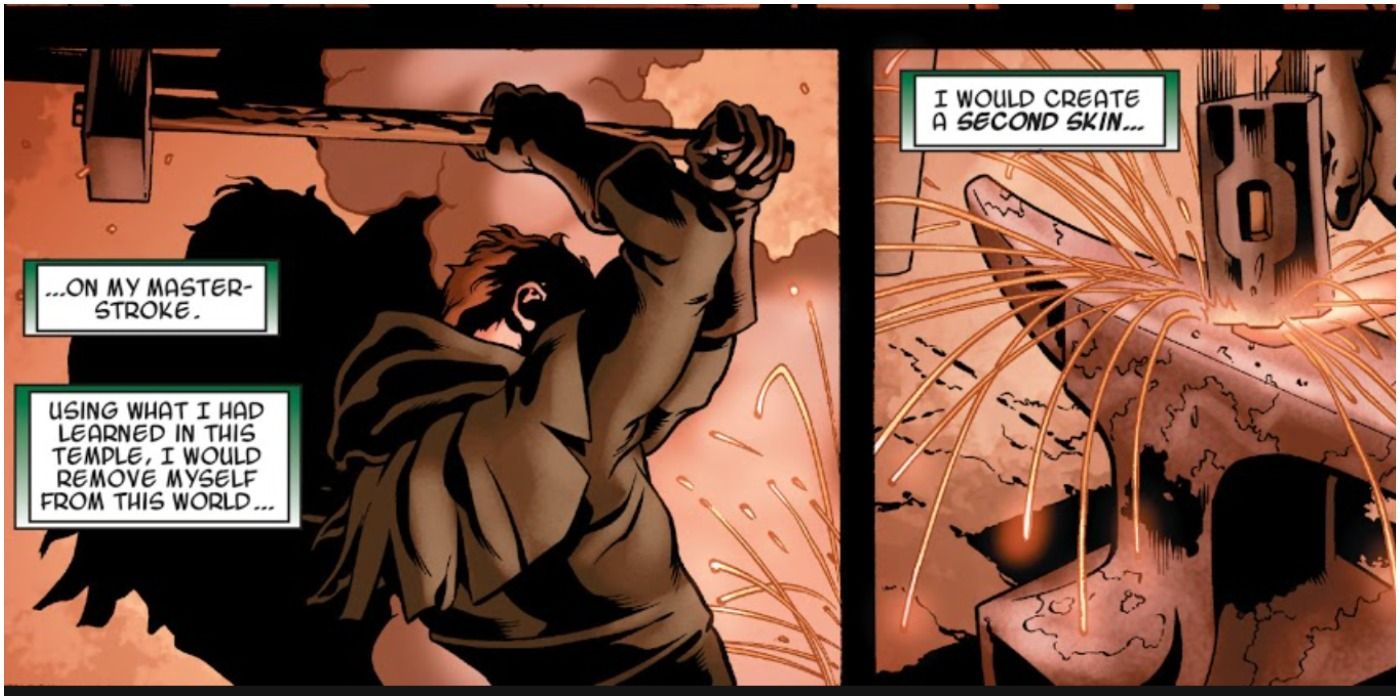
It wasn’t a boast. It was a burial. A funeral for the boy named Victor, and a baptism for the man the world would come to fear.
The roots of Doom’s legend were first unearthed in Fantastic Four Annual #2, by the hands of Kirby and Lee—his creators, his chroniclers. But it was in Books of Doom, Ed Brubaker and Pablo Raimondi’s haunting reimagining, where the myth bled deeper. Issue by issue, they peeled away the bravado and exposed the raw ritual of transformation.
In the fourth chapter, high above the world in a cloistered Himalayan monastery, Victor forged more than armor—he forged a boundary. Between flesh and fire. Between past and present. Between the man who lost his mother and the force that would never lose anything again.
The armor was not merely protection. It was exorcism.
For Victor, the scars on his face were nothing compared to the ones Mephisto carved into his dreams. Night after night, the devil haunted him—not just with torment, but with reminders. Of helplessness. Of the price of failure. So Doom sealed his body in sorcery-forged steel—not only to mask the disfigurement but to silence the whispers of Hell. To cage the pain, not deny it. To wear it like a crown.
In Books of Doom, we learn: the mask is not a prison. It's a promise. That no demon, no god, no phantom of the past will ever reach Victor Von Doom again.
He did not banish pain.
He conquered it.
"You, the legendary bravest of the brave, shall live out the rest of your days in abject fear..."
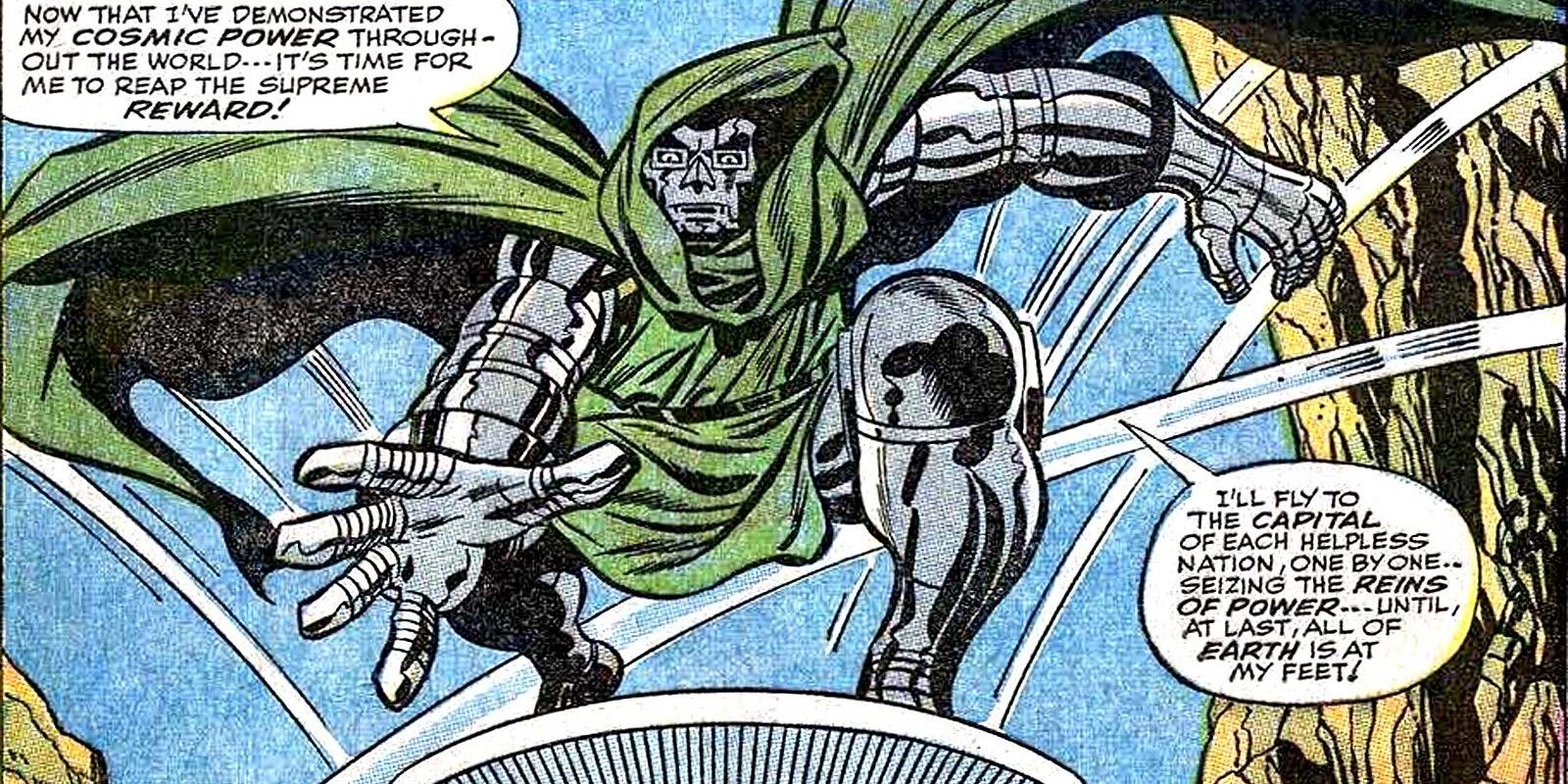
Not a threat. Not even a curse.
It was a sentence. Cold. Clinical. Carved into destiny like an epitaph.
In Fantastic Four #57–60, Kirby and Lee handed Victor Von Doom the keys to a god’s engine—the Power Cosmic of the Silver Surfer. And with it, Doom ascended. Not into enlightenment, but into absolute certainty. What need had Doom for bloodshed when humiliation would echo longer? Why slay the Fantastic Four, when he could let them live—to witness their irrelevance?
In the 1994 animated finale, that idea reached chilling clarity. Doom doesn’t destroy his enemies. He strands them—on a forgotten island, a footnote to his reign. He no longer needs to crush them. That would be too kind.
"Knowing you are utterly powerless to stop me... that you are no longer important enough for me to destroy."
That line—that cruelty—is Doom at his most terrifying. Because it reveals the depth of his ego not through rage, but through dismissal. The Fantastic Four, once his eternal opposition, are now beneath his notice. Not because they are weak—but because he has risen so far above.
This is Doom in his purest form:
A tyrant not satisfied with conquering bodies—he conquers hope.
A villain who doesn’t just want victory—he wants his enemies to witness it, and understand how small they’ve become in its shadow.
To Doom, oblivion is mercy. Irrelevance? That’s the real punishment.
“This world is mine to rule, and mine alone. These… reptiles may not have it.”
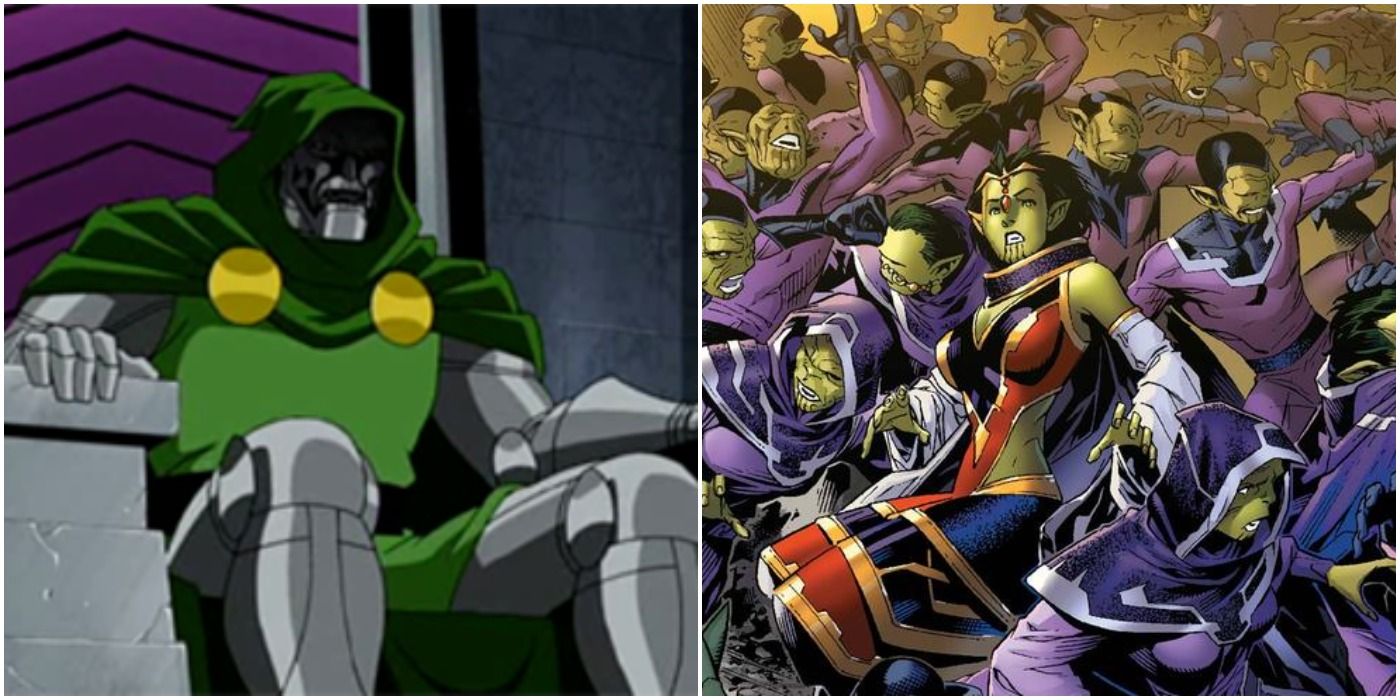
He doesn’t shout. He declares.
Not with desperation—but with the weight of inevitability.
When Doom steps into The Avengers: Earth’s Mightiest Heroes in the second season, he isn’t just another villain. He’s a force. A sovereign in iron and intellect, moving through chaos with cold precision. While others scramble to uncover the shape-shifting plague of the Skrulls, Doom already knows. Doom always knows.
But make no mistake—his intervention is not born of virtue. Doom doesn’t save the Earth. He claims it.
The Skrulls want to infiltrate, to manipulate, to conquer from within. Doom rejects their methods not because they're evil—but because they're unworthy. They are parasites dressed in the skin of gods. And in Doom’s eyes, no pretender, no invader, no slithering impostor deserves to lay claim to his world.
He aids Iron Man not as an ally, but as a curator of the planet’s fate. He gives the heroes a device not out of trust, but because tools—even sentient ones—can still serve his design.
In that one line—“This world is mine to rule…”—you hear it all.
The pride.
The paranoia.
The possessiveness.
The promise.
Victor Von Doom is not Earth's protector. He is its proprietor. And when alien gods come knocking, he doesn’t band together—he builds walls of will and fire, and dares the universe to test his claim.
Because to Doom, the world is not a battleground.
It’s a throne.
“Dear, dear Valeria. I will miss you more than any will ever imagine… but I will always hold you close to me.”
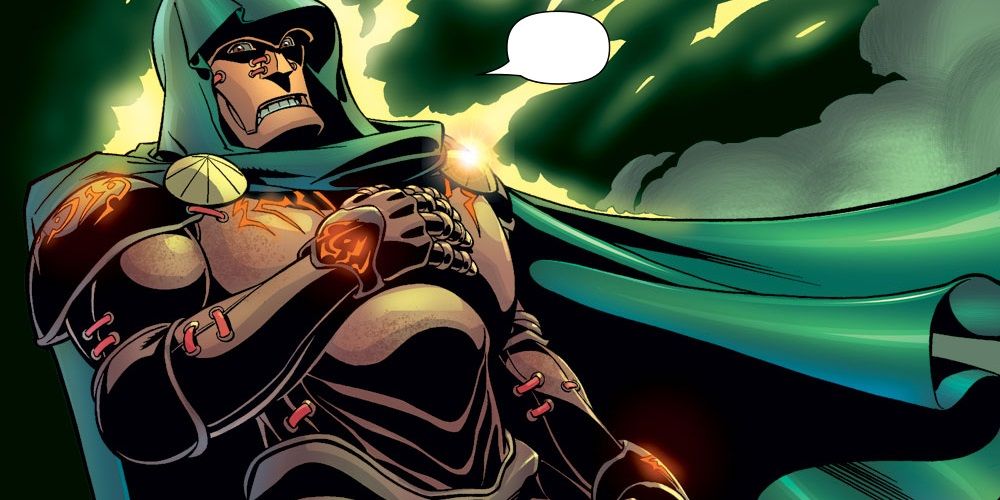
It sounds tender. Like a farewell spoken by a man holding onto a lost love. But coming from Doom, it's something else entirely. It’s a confession of something horrifying.
In Unthinkable by Mark Waid and Mike Wieringo, Victor Von Doom comes to a brutal realization—he’s been trying to beat Reed Richards at the wrong game. Science was never his true path. Reed would always have the edge there. So Doom does something no one expects—he fully embraces magic. And not just any magic—dark magic.
To unlock its full potential, he makes a pact with demons. As always with Doom, it’s a calculated move. But even he can’t escape the price.
The demons ask for a sacrifice. Not a symbol. Not a gesture. A soul.
So Doom seeks out Valeria, the one woman who ever saw the good in him. His childhood love. When they meet, he acts like he’s ready to leave it all behind. He says he wants peace, a second chance—with her. And Valeria, kind and trusting, accepts.
Then Doom reveals the truth.
She isn’t his future—she’s the payment.
The demons tear her apart—burn her, strip her skin, take her soul. All while Doom watches. Not with sadness. With purpose.
Because he didn’t just need to sacrifice someone. He needed to sacrifice someone who mattered.
Her flesh is literally turned into his new armor. He meant it when he said he’d keep her close—he wears her now, built into every plate of mystic steel.
This wasn’t a man breaking bad.
This was a man deciding that nothing—not love, not morality, not humanity—mattered more than victory.
That’s what makes Doom terrifying. Not his power.
His resolve.
“Doom is no man’s second choice.”
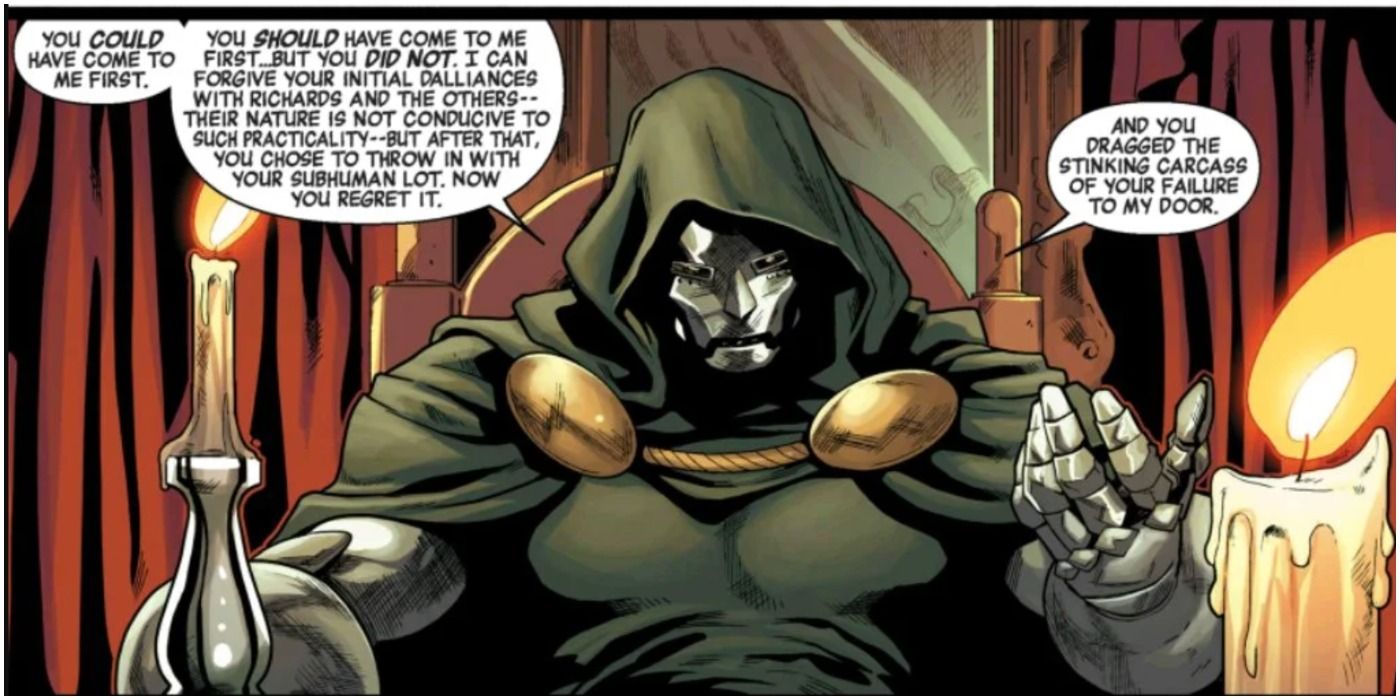
He doesn’t say it with anger. He doesn’t need to.
It’s not a demand. It’s a fact. A rule. A line in the sand carved deeper than any alliance could cross.
In Jonathan Hickman’s Avengers run, the multiverse is falling apart—worlds are crashing into each other in cosmic suicide. The Illuminati, Marvel’s secret think tank of the most brilliant minds and powerful figures, tries to stop the destruction without crossing moral lines. But Namor? He loses patience. He forms the Cabal—a collection of villains who don’t hesitate to destroy other universes to save their own.
At first, Namor believes the Cabal is a necessary evil. But eventually, he sees it for what it is: genocide disguised as strategy. And when it becomes too much—even for him—he goes looking for someone even more dangerous. Someone smarter. Someone who can fix everything.
He goes to Victor Von Doom.
But Doom isn’t flattered. He’s insulted.
Because Namor didn’t come to him first.
He came after the world’s so-called heroes failed.
After the monsters turned out to be worse than heroes.
He came to Doom as a backup plan.
And that’s unacceptable.
To Doom, it’s not about the situation. It’s about respect. If you only call him when everything else has crumbled—then you don’t deserve him. Because Doom doesn’t play cleanup. He doesn't answer distress calls. Doom leads. He commands. He builds. And if you couldn’t see that from the beginning, you’re beneath him.
Namor wanted a savior.
Doom refuses to be anyone’s afterthought.
Because in the eyes of Victor Von Doom, being second isn’t just offensive.
It’s unworthy.
“Now, let mankind beware, for Doctor Doom has attained powers without limit—power enough to challenge Galactus himself!”
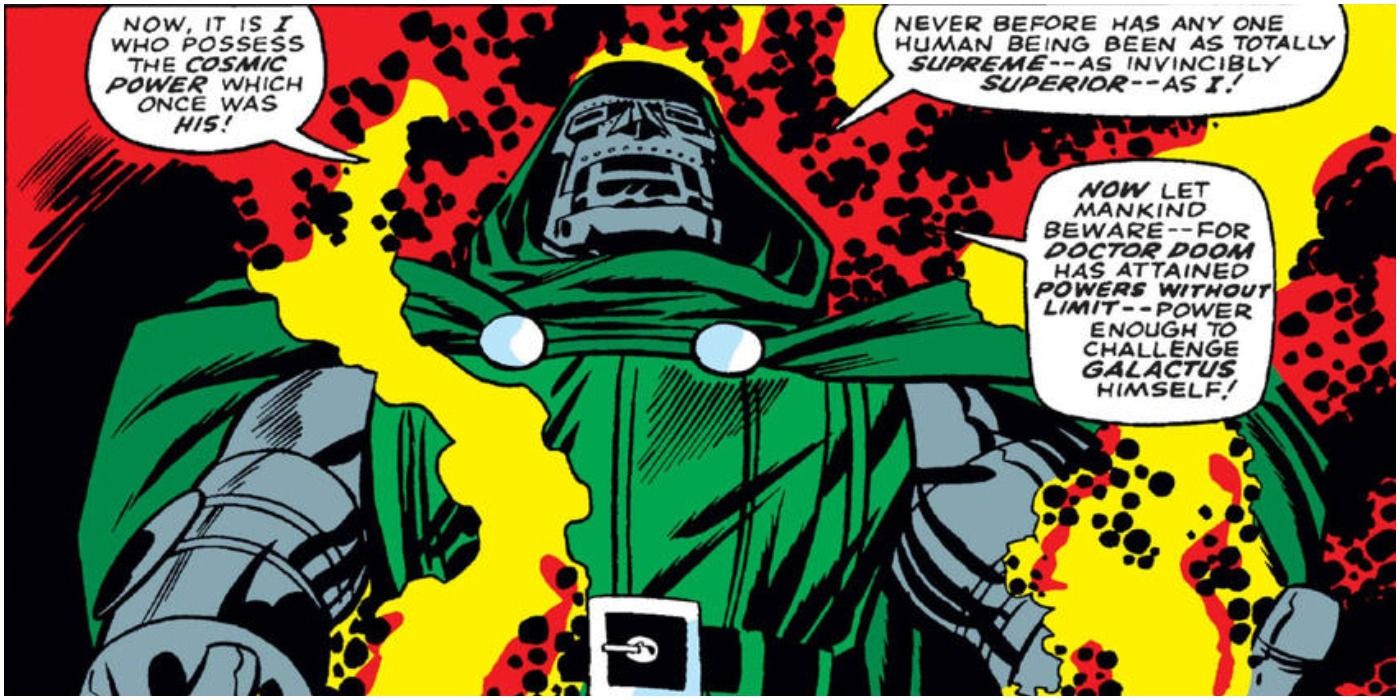
This isn’t just a boast. It’s a warning.
And it doesn’t come from a madman—it comes from a man who just proved the impossible can be done.
In Fantastic Four #57, Doom pulls off one of the most audacious power grabs in Marvel history. With calculation and cold charisma, he lures the Silver Surfer to his stronghold in Latveria—not to imprison him, but to strip him. To take the Power Cosmic from Galactus’ herald and claim it for himself.
And he does it.
On Page 15, it all erupts in one unforgettable panel.
Doom, arms raised, absorbing the raw, celestial fire of the cosmos. The red and black energy lashes out like hellfire, crashing against the cool green of his cloak and the dull gleam of his gray armor.
Beneath him, the Silver Surfer—once a symbol of freedom, nobility, and otherworldly power—lies twisted, drained, and broken.
He doesn’t resist. He can’t.
And Doom? He doesn’t revel. He rises.
He stands tall, body surging with energy that not even Earth’s mightiest heroes could comprehend—let alone contain.
This isn’t about ruling a country. This isn’t about besting Reed Richards. This is about reshaping the very scale of power in the universe.
Because in this moment, Doom isn’t just a man in armor.
He’s a god in waiting.
And Galactus? He’s no longer untouchable.
Doom doesn't whisper his threat.
He declares it—to the cosmos itself.
And now, mankind should beware…
Because the age of Doom has truly begun.
“Miss Van Dyne, I am not some common criminal that can be distracted by your prattling.”
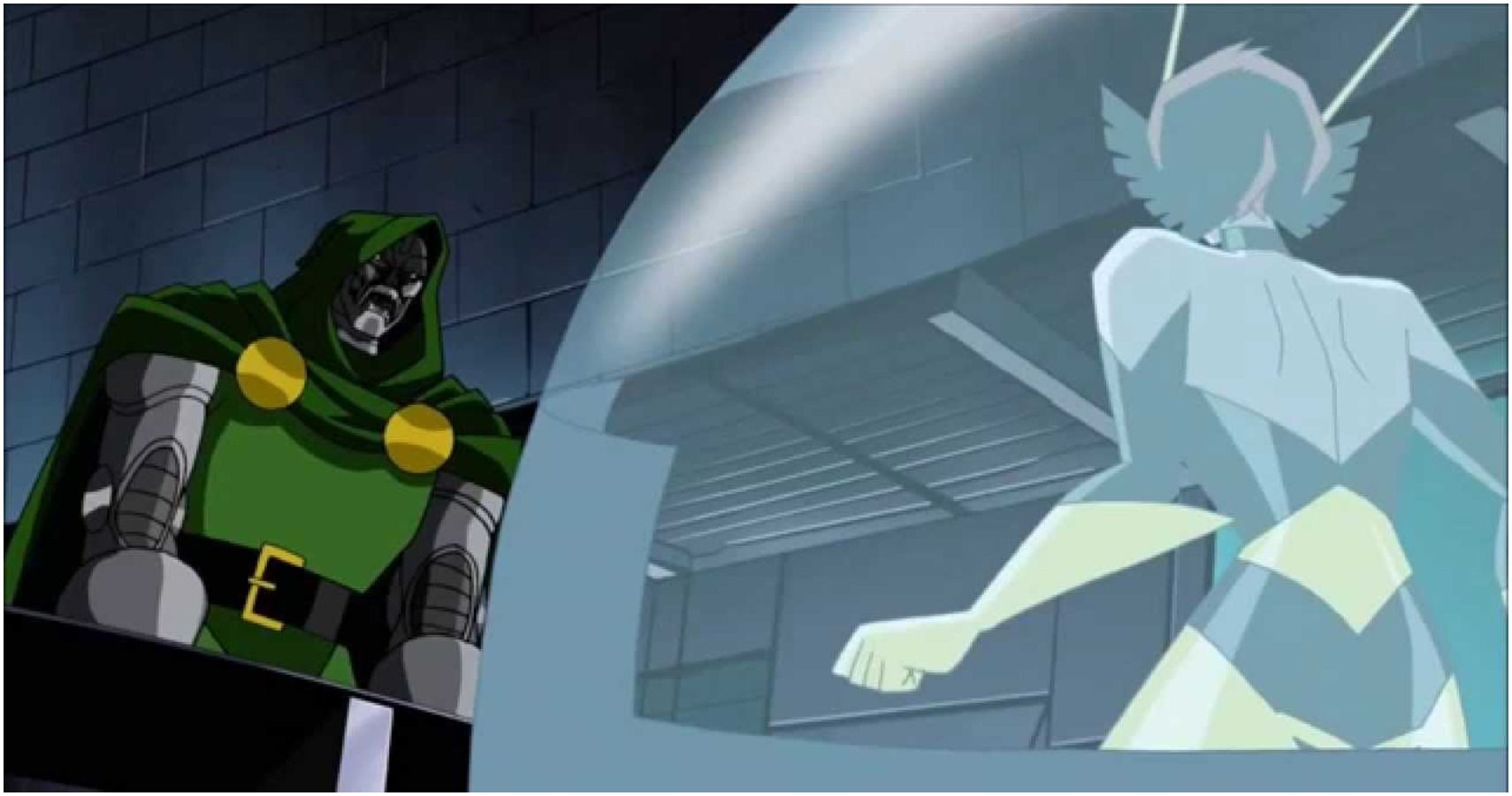
Doom doesn’t shout. He doesn’t lose his temper.
He doesn’t need to.
In The Private War of Doctor Doom, he’s already ten steps ahead. While others play at heroics and banter, Doom is orchestrating a strategy that spans kingdoms and dimensions. His Doombots have captured the Invisible Woman—key to his greater plan—and by sheer chance, the Wasp is caught in the net too.
As Doom works in silence, Wasp does what Wasp does—talks. Mocks. Provokes. It’s not bravado; it’s instinct. She’s trying to disrupt him, get a reaction. Get under his skin.
But Doom doesn’t flinch. Doesn’t blink. Doesn’t even respond—until he decides it’s time to shut it down, permanently.
And when he does, it’s ice-cold.
“You are nothing to Doom.”
Not an insult. Not hyperbole. Just truth, as Doom sees it.
A flick of contempt that cuts deeper than shouting ever could.
He doesn’t see Wasp as a threat, or even a nuisance.
She’s background noise.
And her attempts at psychological warfare? Worth “less than nothing.”
He tells her to stop embarrassing herself—and for a second, she actually does.
Because even someone as sharp-tongued as Janet Van Dyne knows:
You don’t shake Doom.
You don’t get under his skin.
Because there is no room in Doom’s mind for distraction, doubt, or weakness.
Only purpose.
Only precision.
Only Doom.
“I was a God, Valeria. I found it... beneath me.”
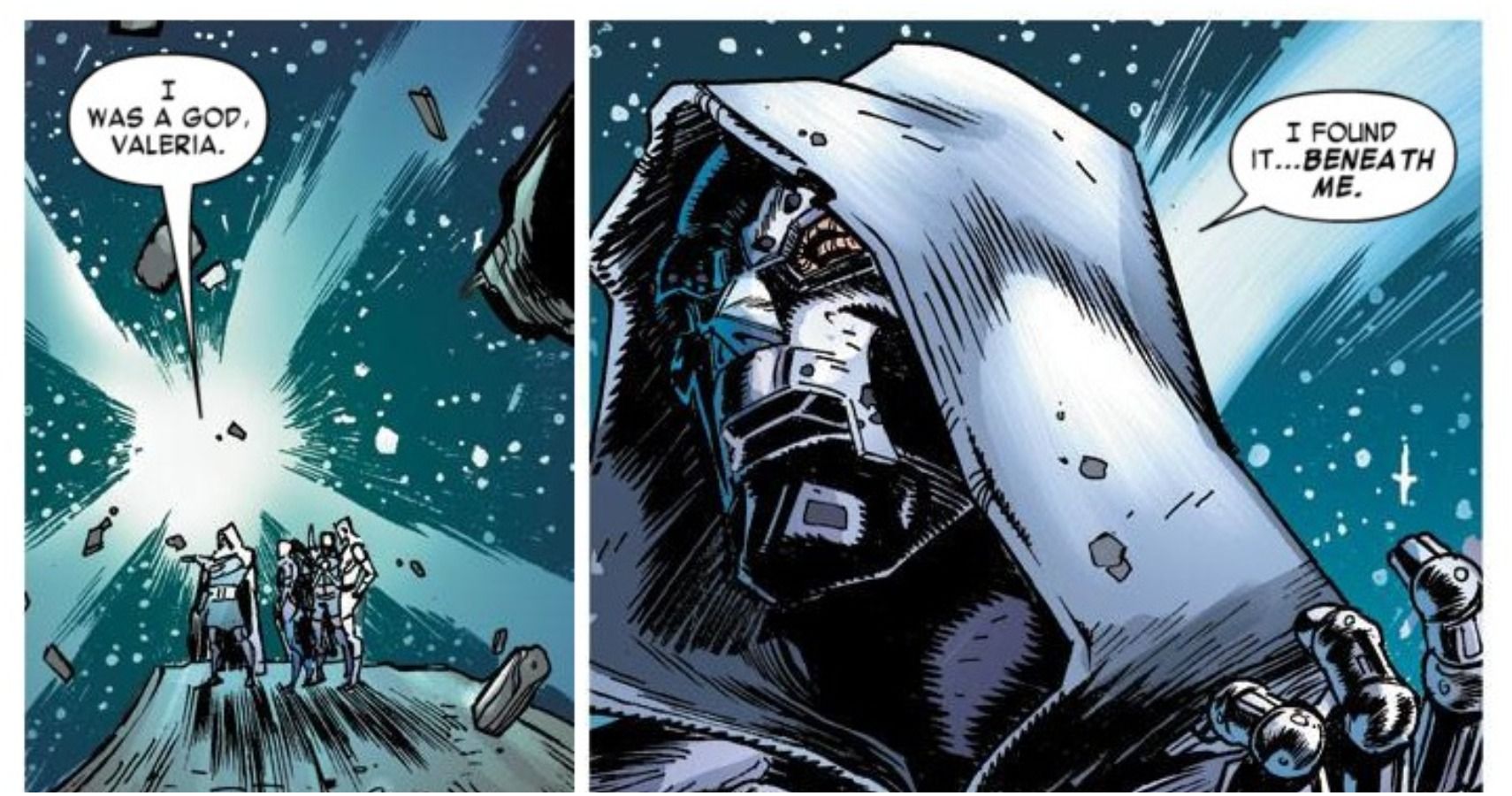
Doom speaks this not with regret, but with a certain, chilling finality. Because for all his ambition, his plans, and his calculated, relentless pursuit of greatness, he’s tasted the heights—and realized they hold no meaning.
In Fantastic Four #611, Doom wields not one, but two Infinity Gauntlets—a god's tool of unimaginable power. He doesn’t just plan to rule a universe. He plans to create one. To bend reality itself, molding existence with his hands and claiming Godhood as his birthright.
And then? It doesn’t work.
But Doom doesn’t flinch. He doesn’t scream or rage.
He simply dismisses the failure with a calm, almost clinical air, turning to Valeria Richards with an indifference that stings.
"I found it beneath me."
This is the essence of Doom.
Not a man driven by power for the sake of it, but a man whose ambition goes beyond even the infinite. He’s not interested in omnipotence for comfort, or peace. Doom thrives in the struggle—the grind, the climb toward something more. The weight of responsibility, the complexity of navigating power and consequence—that’s what he craves.
Being a god isn’t a challenge to Doom. It’s a boredom.
He doesn't seek power to rest on his laurels.
He seeks it to transcend everything.
Even the gods themselves.
Because the moment something becomes easy, beneath him, that’s when Doom loses interest.
This is why Doom’s ego isn’t just about domination—it’s about elevation. The constant, ever-unfulfilled quest for the next horizon. Power is never enough. It’s the journey that defines him. And in that journey, even Godhood falls short.
In the end, Doctor Doom isn't just a villain. He isn’t merely a man obsessed with power. He’s the embodiment of endless ambition, a figure who sees nothing as unattainable, yet finds nothing truly satisfying. From ruling nations to wielding the power of the cosmos, Doom continually strives for more—constantly reshaping the world around him, yet never content with any victory. His journey isn’t just about conquering; it’s about constantly transcending, always chasing the horizon.
Victor Von Doom’s greatest strength lies not in his might, but in his refusal to settle. Godhood? Beneath him. The universe? Just a stepping stone.
For Doom, the struggle never ends. And it’s that ceaseless drive, that thirst for something greater, that makes him one of the most compelling characters in the Marvel Universe. Because, in the end, Doom is never just playing for the world. He’s playing for everything. And for a man who believes he’s destined to be more than a mere mortal, that means nothing will ever truly be enough.
Subscribe
Sign up to get the latest on sales, new releases and more …
